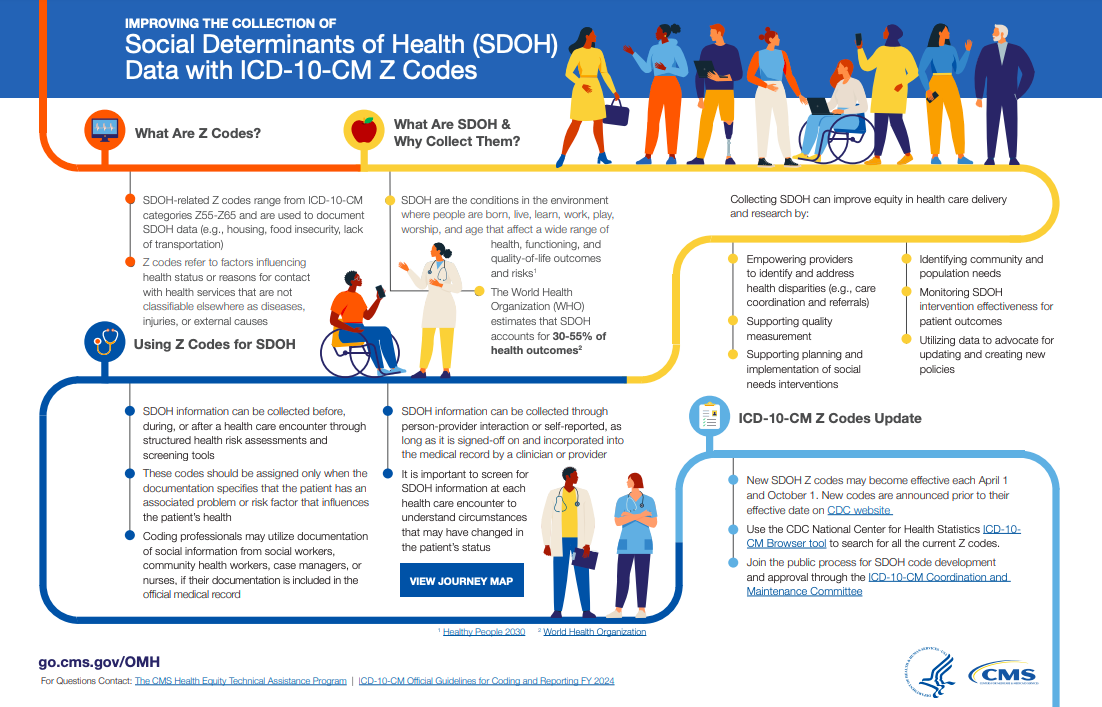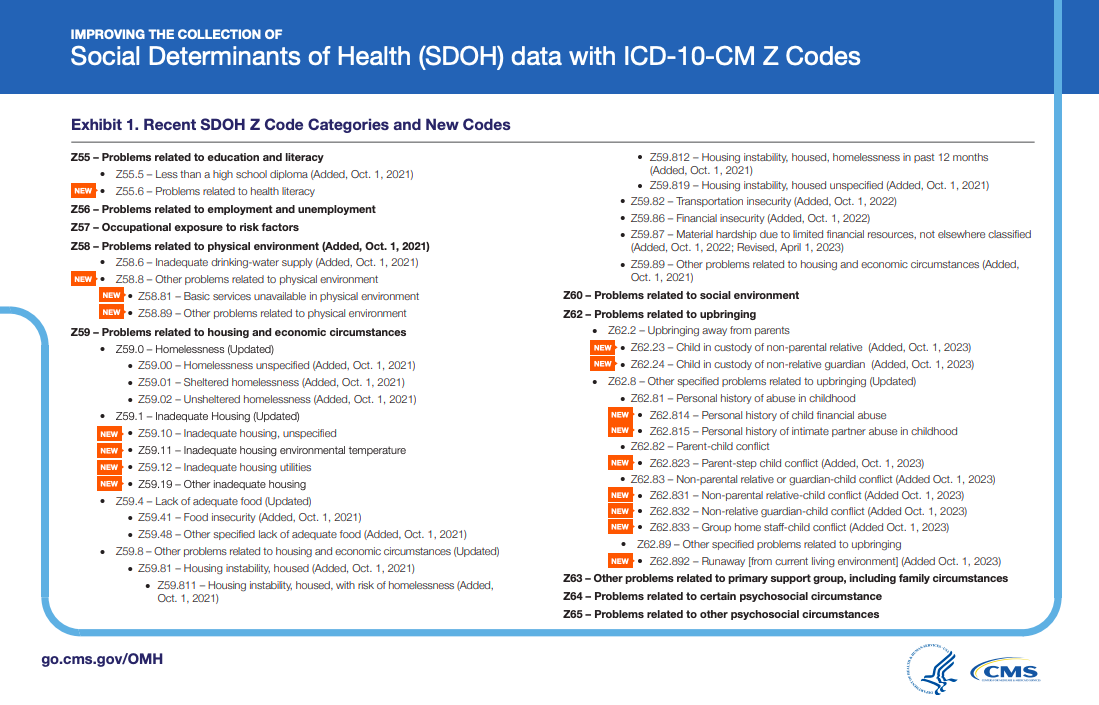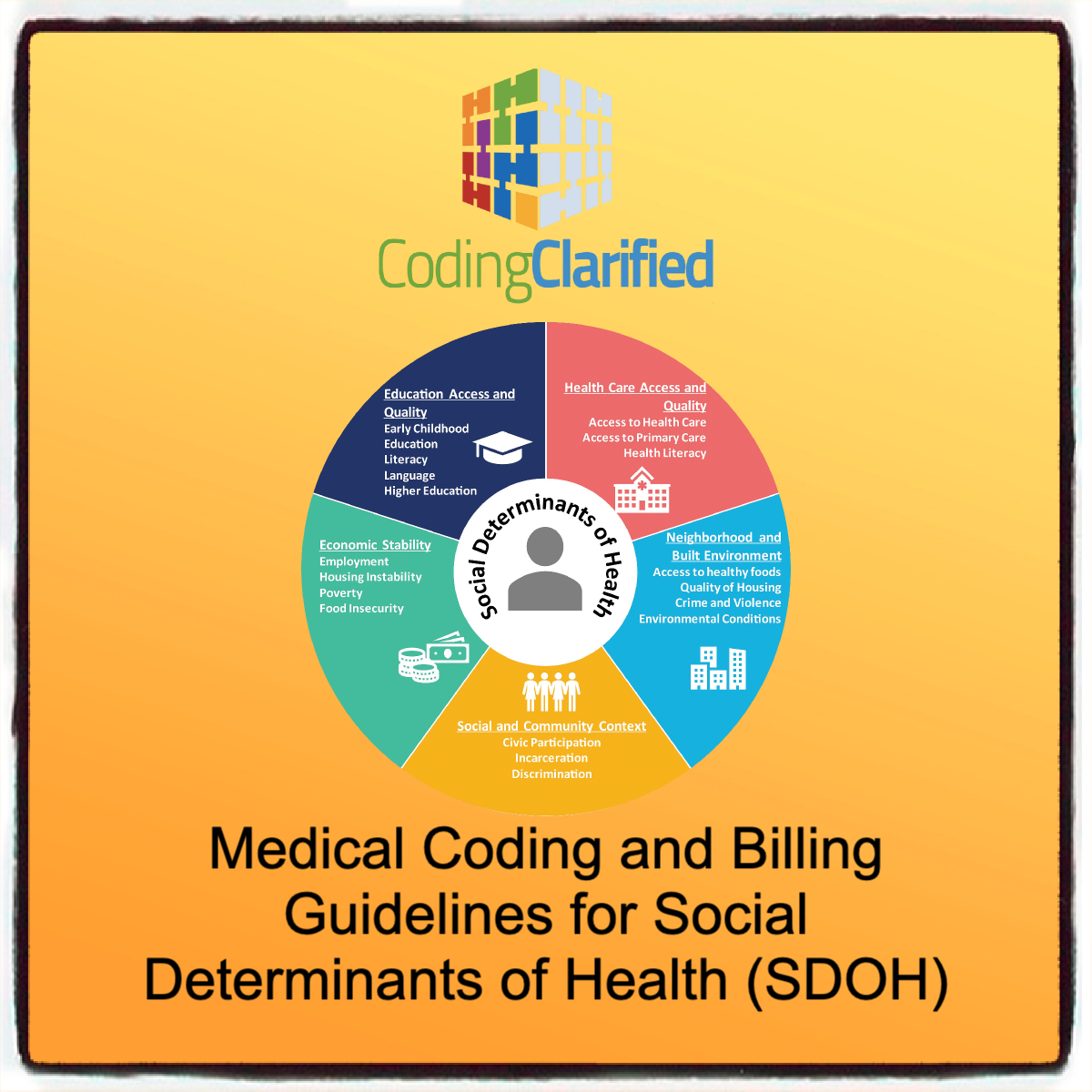Understanding Social Determinants of Health (SDOH)
The World Health Organization (WHO) identifies several key categories of SDOH:
- Economic Stability
- Education Access and Quality
- Healthcare Access and Quality
- Neighborhood and Built Environment
- Social and Community Context
Each of these factors influences individuals’ health and wellbeing. For example, financial strain, lack of access to educational opportunities, unsafe living environments, and inadequate social support can lead to negative health outcomes.
Healthcare systems are recognizing the need to screen for and address these factors, incorporating SDOH-related questions into patient assessments. However, for SDOH to be effectively incorporated into care models, accurate coding and billing procedures must be followed to ensure that providers are reimbursed appropriately for these services.
Importance of Coding for SDOH
Accurate coding of SDOH allows healthcare providers to:
- Document and track the impact of SDOH: Proper coding helps identify patterns in social and environmental factors affecting health.
- Improve patient outcomes: By acknowledging and addressing SDOH, healthcare providers can tailor interventions to meet patients’ broader needs.
- Ensure reimbursement: Appropriate billing for services related to SDOH ensures that providers receive reimbursement for addressing these factors, which can be a part of care coordination or comprehensive care management programs.
- Comply with regulations and standards: Accurate coding for SDOH can help healthcare organizations meet requirements set by payers, including government programs like Medicare and Medicaid.
Coding for SDOH
SDOH-related codes are included in the ICD-10-CM (International Classification of Diseases, 10th Revision, Clinical Modification) coding system, which allows healthcare providers to document social determinants that affect a patient’s health. In addition to ICD-10-CM codes, other codes may be used for services that directly address or relate to SDOH.
ICD-10-CM Codes for SDOH
As of October 1, 2020, ICD-10-CM introduced a new set of codes to help providers document SDOH. These codes are found under Z55-Z65 in the ICD-10-CM coding manual. These codes cover various social determinants, including economic, social, and environmental factors.
Key ICD-10-CM Codes for SDOH
- Z55 – Problems related to education and literacy: This includes issues like illiteracy, low educational attainment, and difficulties with reading or writing.
- Example: Z55.9 (Problem related to education, unspecified)
- Z56 – Employment and unemployment problems: These codes cover issues such as job loss, underemployment, or dangerous working conditions.
- Example: Z56.0 (Unemployment, unspecified)
- Z57 – Occupational exposures: This category covers issues related to exposure to hazardous environments in the workplace.
- Example: Z57.9 (Occupational exposure to unspecified hazards)
- Z59 – Problems related to housing and economic circumstances: This includes factors such as homelessness, inadequate housing, or economic insecurity.
- Example: Z59.0 (Homelessness)
- Z60 – Social environment problems: This includes issues like problems with social relationships or living alone.
- Example: Z60.9 (Problem related to social environment, unspecified)
- Z62 – Upbringing and family environment problems: This category addresses challenges in the family environment, such as child abuse, neglect, or dysfunction.
- Example: Z62.8 (Other specified problems related to upbringing)
- Z63 – Other problems related to primary support group: Codes in this section cover challenges related to family and support systems, including issues like caregiver burden.
- Example: Z63.9 (Problem related to primary support group, unspecified)
- Z64 – Problems related to certain psychosocial circumstances: This section includes factors like life stressors or adjustments to specific circumstances, such as divorce or bereavement.
- Example: Z64.8 (Other specified problems related to psychosocial circumstances)
- Z65 – Other psychosocial circumstances: This category covers factors such as incarceration, homelessness, or exposure to violence.
- Example: Z65.9 (Other specified problems related to social circumstances)
How to Use These Codes
When documenting care, providers should include the appropriate Z-code for any social determinant identified during screenings or assessments. For example, if a patient is experiencing homelessness, a provider would use the Z59.0 code. It is important that these codes are used in conjunction with the primary diagnosis to ensure a complete picture of the patient’s health needs.
Other Billing Codes for SDOH Services
Apart from the ICD-10-CM codes, there are other billing codes related to services addressing SDOH, particularly those used in care coordination or management.
- CPT codes for care coordination (e.g., 99487, 99439): These codes are used to document care coordination activities, including services that address the impact of SDOH.
- HCPCS codes for social services: Certain social services related to addressing SDOH, such as case management or housing assistance, may be reimbursable under specific programs. Providers should check payer-specific guidelines to ensure proper coding and reimbursement for these services.
Billing Considerations for SDOH
- Payer policies: Different payers, including Medicare, Medicaid, and private insurers, may have varying guidelines for reimbursing SDOH-related services. Providers must review payer-specific policies to ensure compliance.
- Documentation requirements: Proper documentation is essential for justifying the use of SDOH-related codes. Providers should maintain detailed records of screenings, interventions, and follow-up care addressing social determinants.
- Comprehensive care models: SDOH are often addressed within the context of value-based care or integrated care models. In these models, care teams address medical, social, and behavioral needs. Billing should reflect the holistic nature of care, including time spent addressing SDOH.
Challenges in Coding and Billing for SDOH
While the introduction of specific codes for SDOH has provided a framework for accurate billing and reimbursement, challenges remain:
- Inconsistent documentation: Providers may not consistently document SDOH factors, making it difficult to capture the full range of a patient’s needs.
- Varying payer policies: Different insurance carriers may have different reimbursement policies for addressing SDOH, creating complexity for providers.
- Lack of standardization: While ICD-10-CM codes help, the collection and use of SDOH data are not yet standardized across all healthcare systems.
- Screening fatigue: Patients may become overwhelmed by multiple screenings for social factors, and providers may find it time-consuming to consistently address these factors.
Best Practices for Addressing SDOH in Coding and Billing
To effectively code and bill for SDOH, healthcare organizations should implement the following best practices:
- Incorporate SDOH screenings into routine care: Regular screenings for SDOH can help identify issues early and ensure that they are documented.
- Educate staff on proper coding practices: Healthcare providers, coders, and billers should receive training on the importance of SDOH and how to use the appropriate ICD-10-CM codes.
- Develop comprehensive care plans: Include social factors in care plans and document interventions that address these issues.
- Collaborate with community partners: Work with social service organizations to provide wraparound services that address SDOH, and ensure that these services are accurately documented in billing.
- Stay updated on coding and billing guidelines: Regularly review coding guidelines and payer policies to ensure compliance and maximize reimbursement opportunities.
Incorporating Social Determinants of Health into medical coding and billing practices is essential for improving healthcare delivery and outcomes. By accurately coding for SDOH, healthcare providers can ensure proper reimbursement, improve patient care, and support broader public health goals. Understanding and adhering to coding guidelines for SDOH will enable healthcare organizations to take a more holistic approach to patient care and to document the impact of social factors on health outcomes.
CMS SDOH:
https://www.cms.gov/files/document/cms-2023-omh-z-code-resource.pdf



